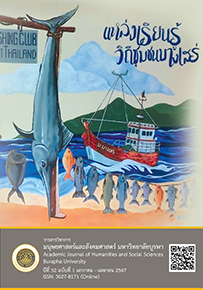Form, Function, and Semantics Relationship of the Pledges in Duties and Careers in Thai Society
Main Article Content
Abstract
The research investigates the structure, purpose, and semantics relations within Thai society’s pledge of duties and careers from October to November 2023. Data was collected from government and private agencies’ websites, resulting in 35 pledges. The findings indicate a prose style, utilization of descriptive rhetoric, and rhetorical strategies. The Pledge has six components: saying names, commissive speech acts, a pledge to behave and not to behave, saying cause-effect of fulfilling promises, citing professional standards or regulations, and saying the profession’s name. The pledges encompass 3 duties: guiding personal behavior, fostering solidarity, and instilling confidence and trust. The study categorizes word meanings into 8 groups: “ethics,” “care,” “self-representation,” “determination,” “morality,” “territory,” “regime,” and “pride.”
Downloads
Article Details

This work is licensed under a Creative Commons Attribution-NonCommercial-NoDerivatives 4.0 International License.
บทความทุกบทความเป็นลิขสิทธิ์ของวารสารวิชาการมนุษยศาสตร์และสังคมศาสตร์ มหาวิทยาลัยบูรพาเท่านั้น
References
นววรรณ พันธุเมธา. (2544). คลังคำ. อมรินทร์.
นันทนา วงษ์ไทย. (2562). ภาษาและความหมาย (พิมพ์ครั้งที่ 2). เวิร์ค ออล พริ๊นท์.
ราชบัณฑิตยสถาน. (2556). พจนานุกรมฉบับราชบัณฑิตยสถาน พ.ศ. 2554. นานมีบุ๊คส์พับลิเคชั่นส์.
ลิขิต ธีรเวคิน. (2551). การถวายสัตย์ปฏิญาณ. http://wiki.kpi.ac.th/index.php?title=การถวายสัตย์ปฏิญาณ
วิกานดา เกียรติมาโนชญ์ และจันทิมา อังคพณิชกิจ. (2559). หน้าที่ของถ้อยคำสาปแช่งและสาบานในวาทกรรมการเมืองไทย. วารสารวจนะ, 4(2), 1-19.
สุริยา รัตนกุล. (2544). อรรถศาสตร์เบื้องต้น. สำนักพิมพ์มหาวิทยาลัยมหิดล.
อาทิตย์ ศรีจันทร์. (2555). วรรณกรรมคำสัตย์สาบานในกฎหมายตราสามดวง. [รายงานวิจัยฉบับสมบูรณ์]. มหาวิทยาลัยราชภัฏสวนสุนันทา.
อุดม วโรตม์สิกขดิตถ์. (2537). ภาษาศาสตร์เหมาะสมัยเบื้องต้น. ต้นธรรมสำนักพิมพ์.
Austin, J. L. (2002). How to do things with words (2nd ed.). Oxford University Press.


